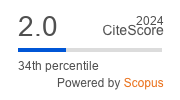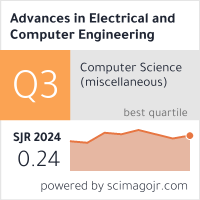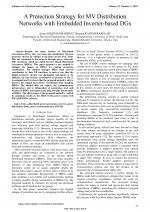| 3/2022 - 3 |
A Protection Strategy for MV Distribution Networks with Embedded Inverter-based DGsSOLEIMANISARDOO, A. |
| Extra paper information in |
| Click to see author's profile in |
| Download PDF |
Author keywords
distributed power generation, inverter, power distribution faults, power system protection, PSCAD
References keywords
power(24), protection(17), distributed(15), generation(13), distribution(12), inverter(10), systems(9), energy(9), fault(8), scheme(7)
Blue keywords are present in both the references section and the paper title.
About this article
Date of Publication: 2022-08-31
Volume 22, Issue 3, Year 2022, On page(s): 25 - 32
ISSN: 1582-7445, e-ISSN: 1844-7600
Digital Object Identifier: 10.4316/AECE.2022.03003
Web of Science Accession Number: 000861021000003
SCOPUS ID: 85137694601
Abstract
Despite the many benefits of Distributed Generations (DGs), they can cause mis-coordination between protective devices by changes in the fault current level. Many DGs are connected to the network through power electronic (PE) interfaces, which are called Inverter Based Distributed Generators (IBDGs). This paper proposes a new method to mitigate the impact of IBDGs on existing protection coordination. The method manages IBDG fault current contribution by their PE interfaces in such a way that the digital protective devices can distinguish and ignore it. In addition, the fuse-recloser coordination in presence of DG is investigated and it is shown that the proposed method is able to preserve the original fuse-recloser coordination after installing IBDGs. The method does not require any communication infrastructure and is independent of penetration level and location of IBDGs and supports the plug and play functionality of IBDGs. The effectiveness of the proposed method is verified by simulation results on the IEEE 33-Bus power system with PSCAD/EMTDC software. |
| References | | | Cited By «-- Click to see who has cited this paper |
| [1] A. An, B. Zheng, H. Zheng, C. Zheng and P. Du, "Benefit analysis and evaluation of distributed generation in distribution network under active management," 2016 Chinese Control and Decision Conference (CCDC), 2016, pp. 6031-6035, [CrossRef] [SCOPUS Times Cited 6] [2] L. Mehigan, J. P. Deane, B. P. O. Gallachoir, V. Bertsch, "A review of the role of distributed generation (DG) in future electricity systems," Energy, vol. 163, pp. 822-836, 2018. [CrossRef] [SCOPUS Times Cited 210] [3] H. A. Gil, G. Joos, "Models for quantifying the economic benefits of distributed generation," IEEE Trans. Power Systems, vol. 23, pp. 327-335, 2008. [CrossRef] [SCOPUS Times Cited 169] [4] S. Conti, "Protection issues and state of the art for microgrid with inverter interfaced distributed generators," in International Conference on Clean Electrical Power (ICCEP), Italy, 2011, pp. 643-647. [CrossRef] [SCOPUS Times Cited 14] [5] L. Huchel, H. Zeineldin, E. El-Saadany, "Protection coordination index enhancement considering multiple DG locations using FCL," IEEE Trans. Power Delivery, vol. 32, pp. 344-350, 2017. [CrossRef] [SCOPUS Times Cited 53] [6] A. Soleimanisardoo, H. K. Karegar, "Alleviating the impact of DGs and network operation modes on the protection system," IET Generation, Transmission & Distribution, vol. 14, pp. 21-28, 2020. [CrossRef] [SCOPUS Times Cited 8] [7] B. Kroposki, B. Johnson, Y. Zhang, V. Gevorgian, P. Denholm, P. Hodge, B. Hannegan, "Achieving a 100% renewable grid: Operating electric power systems with extremely high levels of variable renewable energy," IEEE Power and Energy Magazine, vol. 15, pp. 61-73, 2017. [CrossRef] [SCOPUS Times Cited 1140] [8] V. Telukunta, J. Pradhan, A. Agrawal, M. Singh, S. G. Srivani, "Protection challenges under bulk penetration of renewable energy resources in power systems: A review," Journal of Power and Energy Systems, vol. 3, pp. 365-379, 2017. [CrossRef] [SCOPUS Times Cited 1140] [9] N. Rajaei, M. H. Ahmed, M. M A. Salama, K. Varma, "Fault current management using inverter-based distributed generators in smart grids," IEEE Trans. Smart Grid, vol. 5, pp. 2183-2193, 2014. [CrossRef] [SCOPUS Times Cited 64] [10] K. Wheeler, M. Elsamahy, F. Faried, "Use of superconducting fault current limiters for mitigation of distributed generation influences in radial distribution network fuse-recloser protection systems," IET Generation, Transmission & Distribution, vol. 11, pp. 1605-1612, 2017. [CrossRef] [SCOPUS Times Cited 38] [11] H. Radmanesh, A. Heidary, S. M. Fathi, G. Babamalek, "Dual function ferroresonance and fault current limiter based on DC reactor," IET Renewable Power Generation, vol. 10, pp. 2058-2065, 2016. [CrossRef] [SCOPUS Times Cited 28] [12] Y. Zhang, R. A. Dougal, "Novel dual-FCL connection for adding distributed generation to a power distribution utility," IEEE Trans. Appl. Supercond., vol. 21, pp. 2179-2183, 2011. [CrossRef] [SCOPUS Times Cited 31] [13] H. Yazdanpanahi, H. Li, W. Xu, "A new control strategy to mitigate the impact of inverter-based DGs on protection system," IEEE Trans. Smart Grid, vol. 3, pp. 1427-1436, 2012. [CrossRef] [SCOPUS Times Cited 180] [14] E. Casagrande, W. L. Woon, H. H. Zeineldin and D. Svetinovic, "A differential sequence component protection scheme for microgrids with inverter-based distributed generators," IEEE Transactions on Smart Grid, vol. 5, pp. 29-37, 2014. [CrossRef] [SCOPUS Times Cited 245] [15] S. Kar, S. R. Samantaray, "Time-frequency transform-based differential scheme for microgrid protection," IET Generation, Transmission & Distribution, vol. 8, pp. 310-320, 2014. [CrossRef] [SCOPUS Times Cited 222] [16] W. Huang, T. Nengling, X. Zheng, C. Fan, X. Yang, B. J. Kirby, "An impedance protection scheme for feeders of active distribution networks," IEEE Transactions on Power Delivery, vol. 29, pp. 1591-1602, 2014. [CrossRef] [SCOPUS Times Cited 107] [17] A. Soleimanisardoo, H. K. Karegar, H. H Zeineldin, "Differential frequency protection scheme based on off-nominal frequency injections for inverter-based islanded microgrids," IEEE Trans. Smart Grid, vol. 10, pp. 2107-2114. 2019. [CrossRef] [SCOPUS Times Cited 117] [18] E. Sortomme, S. S. Venkata, J. Mitra, "Microgrid protection using communication-assisted digital relays," IEEE Trans. Power Del., vol. 25, pp. 2789-2796, 2010. [CrossRef] [SCOPUS Times Cited 533] [19] M. Singh, T. Vishnuvardhan, S. G. Srivani, "Adaptive protection coordination scheme for power networks under penetration of distributed energy resources," IET Generation, Transmission & Distribution, vol. 10, pp. 3919-3929, 2016. [CrossRef] [SCOPUS Times Cited 103] [20] V. Papaspiliotopoulos, G. Korres, V. Kleftakis, N. Hatziargyriou, "Hardware-in-the-loop design and optimal setting of adaptive protection schemes for distribution systems with distributed," IEEE Trans. Power Delivery, vol. 32, pp. 393-400, 2017. [CrossRef] [SCOPUS Times Cited 155] [21] Z. Liu, C. Su, H. K. Hoidalen, Z. Chen, "A Multi-agent system based protection and control scheme for distribution system with distributed generation integration," IEEE Trans. Power Delivery, vol. 32, pp. 536-545, 2017. [CrossRef] [SCOPUS Times Cited 122] [22] F. Coffele, C. Booth, A. Dysko, "An adaptive overcurrent protection scheme for distribution networks," IEEE Trans. Power Delivery, vol. 30, pp. 561-568, 2015. [CrossRef] [SCOPUS Times Cited 298] [23] P. T. Manditereza, R. Bansal, "Renewable distributed generation. The hidden challenge-A review from the protection perspective," Renewable and Sustainable Energy Reviews, vol. 58, pp. 1457-1465, 2016. [CrossRef] [SCOPUS Times Cited 225] [24] I. Sadeghkhani, M. E. H. Golshan, J. M. Guerrero, A. Mehrizi-Sani, "A current limiting strategy to improve fault ride-through of inverter interfaced autonomous microgrids," IEEE Trans. Smart Grid, vol. 8, pp. 2138-2148, 2017. [CrossRef] [SCOPUS Times Cited 210] [25] X. Pei, Y. Kang, "Short-circuit fault protection strategy for high power three-phase three-wire inverter," IEEE Transactions on Industrial Informatics, vol. 8, pp. 545-553, 2012. [CrossRef] [SCOPUS Times Cited 80] [26] C. Plet, M. Graovac, T. C. Green, R. Iravani, "Fault response of grid-connected inverter dominated networks," in IEEE Power and Energy Society General Meeting, USA, 2010, pp. 25-29. [CrossRef] [SCOPUS Times Cited 175] [27] N. Bottrell, T. C. Green, "Comparison of current-limiting strategies during fault ride-through of inverters to prevent latch-up and wind-up," IEEE Trans. Power Electron, vol. 29, pp. 3786-3797, 2014. [CrossRef] [SCOPUS Times Cited 271] [28] M. M. Zamani, A. Yazdani, T. S. Sidhu, "A control strategy for enhanced operation of inverter-based microgrids under transient disturbances and network faults," IEEE Trans. Power Deliver, vol. 27, pp. 1737-1747. 2012. [CrossRef] [SCOPUS Times Cited 271] [29] Z. Shuai, C. Shen, X. Yin, X. Liu, Z. J. Shen, "Fault analysis of inverter-interfaced distributed generators with different control schemes," IEEE Transactions on Power Delivery, vol. 3, pp. 1223-1235, 2018. [CrossRef] [SCOPUS Times Cited 260] [30] S. Chaitusaney, A. Yokoyama, "Prevention of reliability degradation from recloser - fuse miscoordination due to distributed generation," IEEE Trans. Power Delivery, vol. 23, pp. 2545-2554, 2008. [CrossRef] [SCOPUS Times Cited 174] [31] "IEEE Guide for the Operation, Classification, Application, and Coordination of Current-Limiting Fuses with Rated Voltages 1-38 kV," in IEEE Std C37.48.1-2002 , vol., no., pp.1-68, 6 Aug. 2002, (R.2008). [CrossRef] [32] H. Li, F. Li, Y. Xu, D. T. Rizy, J. D. Kueck, "Adaptive voltage control with distributed energy resources: Algorithm, theoretical analysis, simulation, and field test verification," IEEE Trans. Power Systems, vol. 25, pp. 1638-1647, 2010. [CrossRef] [SCOPUS Times Cited 164] [33] S. H. Horowitz, A. G. Phadk, Power system relaying. Wiley & Sons, New York, 1992 [34] B. Venkatesh, R. Ranjan, H. B. Gooi, "Optimal reconfiguration of radial distribution networks to maximize load ability," IEEE Transactions on Power Systems, vol. 19, pp.260-266, 2004. [CrossRef] [SCOPUS Times Cited 342] Web of Science® Citations for all references: 0 SCOPUS® Citations for all references: 7,155 TCR Web of Science® Average Citations per reference: 0 SCOPUS® Average Citations per reference: 204 ACR TCR = Total Citations for References / ACR = Average Citations per Reference We introduced in 2010 - for the first time in scientific publishing, the term "References Weight", as a quantitative indication of the quality ... Read more Citations for references updated on 2025-07-01 11:21 in 220 seconds. Note1: Web of Science® is a registered trademark of Clarivate Analytics. Note2: SCOPUS® is a registered trademark of Elsevier B.V. Disclaimer: All queries to the respective databases were made by using the DOI record of every reference (where available). Due to technical problems beyond our control, the information is not always accurate. Please use the CrossRef link to visit the respective publisher site. |
Faculty of Electrical Engineering and Computer Science
Stefan cel Mare University of Suceava, Romania
All rights reserved: Advances in Electrical and Computer Engineering is a registered trademark of the Stefan cel Mare University of Suceava. No part of this publication may be reproduced, stored in a retrieval system, photocopied, recorded or archived, without the written permission from the Editor. When authors submit their papers for publication, they agree that the copyright for their article be transferred to the Faculty of Electrical Engineering and Computer Science, Stefan cel Mare University of Suceava, Romania, if and only if the articles are accepted for publication. The copyright covers the exclusive rights to reproduce and distribute the article, including reprints and translations.
Permission for other use: The copyright owner's consent does not extend to copying for general distribution, for promotion, for creating new works, or for resale. Specific written permission must be obtained from the Editor for such copying. Direct linking to files hosted on this website is strictly prohibited.
Disclaimer: Whilst every effort is made by the publishers and editorial board to see that no inaccurate or misleading data, opinions or statements appear in this journal, they wish to make it clear that all information and opinions formulated in the articles, as well as linguistic accuracy, are the sole responsibility of the author.



